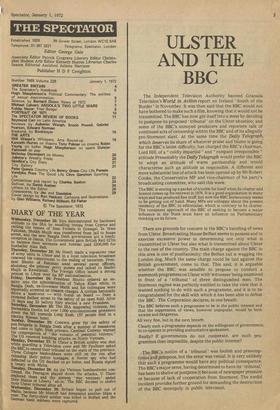ULSTER AND THE BBC
The Independent Television Authority banned Granada Television's World in Action report on Ireland South of the Border ' in November. It was then said that the BBC would not have bothered to make such a film, knowing that it would not be transmitted. The BBC has now got itself into a mess by deciding to postpone its proposed tribunal ' on the Ulster situation; and some of the BBC's annoyed producers and reporters talk of continued acts of censorship within the BBC and of its allegedly pro-Stormont slant. At the same time the Daily Telegraph, which deserves its share of whatever praise and blame is going for the BBC's latest difficulty, has charged the BBC's chairman, Lord Hill, of a "coldly impartial " and "rampant irresponsible" attitude.Presumably the Daily Telegraph would prefer the BBC to adopt an attitude of warm partisanship and would characterise such an attitude as responsible. & different and more substantial line of attack has been opened up by Mr Robert Cooke, the Conservative MP and vice-chairman of his party's broadcasting committee, who said this week: The BBC is storing up a packet of trouble for itself when its charter and licence comes up for renewal in 1976. It is a good organisation in many ways and has produced fine stuff, but now the BBC bureaucracy seems to be getting out of hand. Many MPs are unhappy about the present tendency of the BBC to editorialise, which is contrary to its charter. The consistent approach of the BBC of seeking to become a major influence in the State must have an influence on Parliamentary thinking on its future.
There are grounds for concern in the BBC's handling of news from Ulster. Broadcasting House Belfast seems to possess and to exercise excessive power in determining not only what is transmitted in Ulster but also what is transmitted about Ulster to the rest of the country. The main charge against the BBC in this area is one of pusillanimity: the Belfast tail is wagging the London dog. Much the same charge could be laid against the British government, come to that. This said, it is arguable whether the BBC was sensible to propose to conduct a mammoth programme on Ulster with' witnesses 'being examined in front of a 'tribunal' of three distinguished men. The Stormont regime was perfectly entitled to take the view that it wanted nothing to do with such a programme, and it is to be congratulated for the skill with which it has been able to defeat the BBC. The Corporation declares, in one breath: The BBC believes such a programme to be in the public interest and that the suppression of views, however unpopular, would be both unwise and dangerous.
All very fine, but in the next breath: Clearly such a programme depends on the willingness of governments to co-operate in providing authoritative spokesmen.
Really? If governments do not cooperate, are such programmes then impossible, despite the public interest?
The BBC's notion of a ' tribunal ' was foolish and presumptuous and pompous, but the error was venial. It is very unlikely that such a programme would have any political consequence. The BBC's major error, having determined to have its ' tribunal,' has been to shelve or postpone it because of newspaper pressure or because of lack of cooperation from Stormont. The sordid incident provides further ground for demanding the destruction of the BBC monopoly in public television.














































 Previous page
Previous page